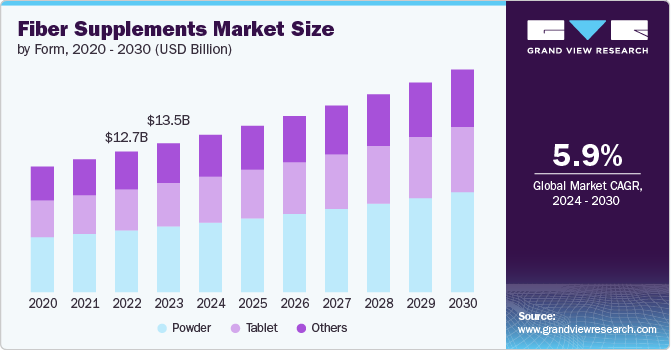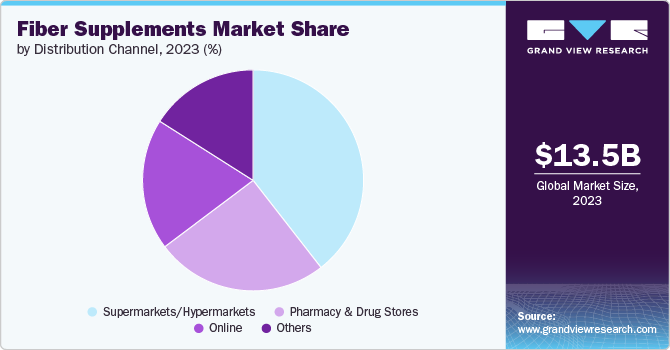
Fiber Supplements Market Size, Share & Trends Analysis Report By Form (Powder, Tablet), By Distribution Channel (Hypermarkets & Supermarkets, Pharmacy & Drug Stores, Online), By Region, And Segment Forecasts, 2024 - 2030
- Report ID: GVR-4-68040-397-3
- Number of Report Pages: 100
- Format: PDF
- Historical Range: 2018 - 2023
- Forecast Period: 2024 - 2030
- Industry: Consumer Goods
Fiber Supplements Market Size & Trends
The global fiber supplements market size was valued at USD 13.5 billion in 2023 and is expected to grow at a CAGR of 5.9% from 2024 to 2030. The market is experiencing significant growth due to a combination of factors related to health awareness, lifestyle changes, and dietary trends. One of the primary drivers is the increasing recognition of the benefits of dietary fiber in maintaining digestive health. As consumers become more educated about the role of fiber in preventing constipation, reducing the risk of colorectal cancer, and supporting overall gut health, there is a heightened demand for supplements that can help meet daily fiber needs.

Another important factor is the rise in chronic health conditions such as obesity, diabetes, and heart disease, which have been linked to poor dietary habits and low fiber intake. As people seek to manage these conditions through diet, fiber supplements are becoming a popular choice for their role in promoting satiety, controlling blood sugar levels, and improving cardiovascular health.
Additionally, the growing trend toward personalized nutrition and the desire for convenience has spurred the fiber supplements market. Busy lifestyles often make it challenging for individuals to consume adequate amounts of fiber through whole foods alone. Fiber supplements offer a practical solution for those looking to enhance their diet without the need for extensive meal planning or preparation.
Moreover, the market is being driven by innovation, and a broader range of fiber supplement products is now available. From traditional soluble and insoluble fibers to more advanced formulations with added prebiotics and probiotics, consumers have access to a diverse array of options tailored to their specific health needs and preferences. This variety not only appeals to a wider audience but also supports ongoing market growth as new products and formulations continue to emerge.
Form Insights
Powdered fiber supplements accounted for a share of 44.16% of the global revenues in 2023. Powders can be easily mixed into a variety of beverages or foods, allowing for customizable dosing and integration into daily routines. This form also often offers a higher concentration of fiber compared to other forms, such as capsules or tablets, making it a more efficient choice for individuals aiming to increase their fiber intake. Additionally, powder supplements generally have a longer shelf life and can be more cost-effective, further enhancing their appeal.
Tablet fiber supplements are anticipated to grow at a CAGR of 6.0% from 2024 to 2030. Tablets are easy to carry, store, and consume, offering a no-mess, no-mixing solution for those who need to increase their fiber intake. Additionally, tablets provide a consistent dose, which can be more
Distribution Channel Insights
Sales through supermarkets/hypermarkets accounted for a share of 39.47% of the global revenues in 2023. These retail formats offer a broad range of products, including fiber supplements, often at competitive prices and with frequent promotions. Their extensive reach and high foot traffic enable consumers to easily purchase fiber supplements as part of their regular shopping routines, contributing significantly to their share of market revenues.

Sales through online distribution channels are anticipated to grow at a CAGR of 7.2% from 2024 to 2030. Consumers are increasingly seeking dietary solutions that support gut health and overall wellness, and online shopping offers a broad range of options, user reviews, and easy access to products that might not be available locally. Additionally, the rise of personalized nutrition and digital health tools has contributed to the heightened demand for fiber supplements.
Regional Insights
North America fiber supplements market is expected to grow at a CAGR of 5.5% from 2024 to 2030. The market is driven by increasing consumer awareness of digestive health, the rising prevalence of gastrointestinal disorders, and a growing emphasis on preventive healthcare. Additionally, the demand is supported by trends toward healthier eating habits, including higher fiber intake for weight management and overall wellness, as well as the expanding availability of a variety of fiber supplement products that cater to different dietary needs and preferences.
U.S. Fiber Supplements Market Trends
The fiber supplements market in the U.S. is expected to grow at a CAGR of 5.8% from 2024 to 2030. In the U.S. the rise in sedentary lifestyles and processed food consumption has further boosted the demand for fiber supplements as a convenient way to improve dietary fiber intake. Additionally, strong marketing efforts, a broad range of product offerings, and growing availability in retail and online channels also contribute to the market's expansion.
Asia Pacific Fiber Supplements Market Trends
The fiber supplements market in Asia Pacific held a share of over 18.02% of the global market in 2023. The region's diverse dietary habits and a shift toward healthier eating are driving the demand for fiber supplements. Additionally, increasing urbanization and the expansion of the retail sector, along with educational campaigns on the benefits of dietary fiber, are contributing to the market's growth.
Europe Fiber Supplements Market Trends
The fiber supplements market in Europe is driven by a growing focus on health and wellness, heightened awareness of the benefits of dietary fiber for digestive and overall health, and a trend toward preventive healthcare. The aging population and rising incidence of chronic diseases are also contributing factors. Additionally, regulatory support for health claims related to fiber and increased availability of a wide range of fiber supplement products across various retail channels are supporting market growth.
Key Fiber Supplements Company Insights
The market for fiber supplements is highly competitive, with a range of companies offering various forms. Many big players are increasing their focus on new form launches, partnerships, and expansion into new markets to compete effectively.
Key Fiber Supplements Companies:
The following are the leading companies in the fiber supplements market. These companies collectively hold the largest market share and dictate industry trends.
- Robinson Pharma, Inc.
- Renew Life
- Benefiber
- Citrucel, Metamucil
- Walgreens
- Now
- Garden of Life
- Renew Life
- Yerba Prima
- Nature’s Bounty
Recent Developments
-
In May 2024, Manitoba Harvest, a leading hemp food manufacturer, launched a new bioactive fiber supplement called Hemp Seed Fiber, which features BrightSeed's upcycled hemp hulls. The supplement is designed to provide a natural source of dietary fiber and promote overall gut health. BrightSeed, a food technology company, has developed a process to upcycle hemp hulls, which are typically considered waste products, into a functional ingredient that can be used in various food and supplement applications.
-
In May 2023, Nestlé India launched Resource Fiber Choice, a new product aimed at improving gut health, which contains Partially Hydrolyzed Guar Gum (PHGG), a prebiotic dietary fiber known for relieving constipation. This plant-derived fiber is gentle on the body and is complemented by immuno-nutrients, providing a significant daily allowance of essential vitamins and minerals. Given that one in four urban Indians experiences gut-related issues due to factors like inadequate fiber intake and poor eating habits.
Fiber Supplements Market Report Scope
|
Report Attribute |
Details |
|
Market size value in 2024 |
USD 14.28 billion |
|
Revenue forecast in 2030 |
USD 20.2 billion |
|
Growth rate (revenue) |
CAGR of 5.9% from 2024 to 2030 |
|
Actuals |
2018 - 2023 |
|
Forecast period |
2024 - 2030 |
|
Quantitative units |
Revenue in USD million/billion, and CAGR from 2024 to 2030 |
|
Report coverage |
Revenue forecast, company ranking, competitive landscape, growth factors, and trends |
|
Segments covered |
Form, distribution channel, and region |
|
Regional scope |
North America; Europe; Asia Pacific; Central & South America; Middle East & Africa |
|
Country scope |
U.S, Canada, Mexico, Germany, U.K., Spain, Italy, France, China, India, Japan, Australia, South Korea Brazil, South Africa, Saudi Arabia |
|
Key companies profiled |
Robinson Pharma, Inc., Renew Life, Benefiber, Citrucel, Metamucil, Walgreens, Now, Garden of Life, Renew Life, Yerba Prima, Nature’s Bounty |
|
Customization scope |
Free report customization (equivalent up to 8 analysts working days) with purchase. Addition or alteration to country, regional & segment scope. |
|
Pricing and purchase options |
Avail customized purchase options to meet your exact research needs. Explore purchase options |
Global Fiber Supplements Market Report Segmentation
This report forecasts revenue growth at the global, regional, and country levels and provides an analysis of the latest industry trends and opportunities in each of the sub-segments from 2018 to 2030. For this study, Grand View Research has segmented the global fiber supplements market report on the basis of form, distribution channel and region.
-
Form Outlook (Revenue, USD Million, 2018 - 2030)
-
Powder
-
Tablet
-
Others
-
-
Distribution Channel Outlook (Revenue, USD Million, 2018 - 2030)
-
Supermarkets/Hypermarkets
-
Pharmacy & Drug Stores
-
Online
-
Others
-
-
Regional Outlook (Revenue, USD Million, 2018 - 2030)
-
North America
-
U.S.
-
Canada
-
Mexico
-
-
Europe
-
Germany
-
U.K.
-
Spain
-
Italy
-
France
-
-
Asia Pacific
-
China
-
India
-
Japan
-
Australia
-
South Korea
-
-
Central and South America
-
Brazil
-
-
Middle East & Africa
-
South Africa
-
Saudi Arabia
-
-
Frequently Asked Questions About This Report
b. The global fiber supplements market size was estimated at USD 13.5 billion in 2023 and is expected to reach USD 14.28 billion in 2024.
b. The global fiber supplements market is expected to grow at a compounded growth rate of 5.9% from 2024 to 2030 to reach USD 20.2 billion by 2030.
b. Powder fiber supplements accounted for a share of 44.16% of the global revenues in 2023. Powders can be easily mixed into a variety of beverages or foods, allowing for customizable dosing and integration into daily routines. This form also often offers a higher concentration of fiber compared to other forms, such as capsules or tablets, making it a more efficient choice for individuals aiming to increase their fiber intake. Additionally, powder supplements generally have a longer shelf life and can be more cost-effective, further enhancing their appeal.
b. Some key players operating in the fiber supplements market are Robinson Pharma, Inc., Renew Life, Benefiber, Citrucel, Metamucil, Walgreens, Now, Garden of Life, Renew Life, Yerba Prima, Nature’s Bounty
b. The fiber supplements market is experiencing significant growth due to a combination of factors related to health awareness, lifestyle changes, and dietary trends. One of the primary drivers is the increasing recognition of the benefits of dietary fiber in maintaining digestive health. As consumers become more educated about the role of fiber in preventing constipation, reducing the risk of colorectal cancer, and supporting overall gut health, there is a heightened demand for supplements that can help meet daily fiber needs.
We are committed towards customer satisfaction, and quality service.
"The quality of research they have done for us has been excellent."




